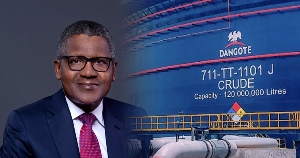Business News of Tuesday, 9 September 2025
Source: www.punchng.com
Buhari threatened to fire me over subsidy removal — Kachikwu
Former Minister of State for Petroleum Resources, Dr Ibe Kachikwu, on Monday, revealed that former Nigerian President, the late Muhammadu Buhari, threatened to sack him should his (Kachikwu) push to remove the petrol subsidy during Buhari’s tenure go wrong.
Kachikwu was the Minister of State for Petroleum Resources from 2016 to 2019. He spoke at a business mentorship lecture series organised virtually by the Nigerian Content Development and Monitoring Board.
He noted that his greatest challenge when he assumed office as Group Managing Director of the Nigerian National Petroleum Company in 2015 was the persistent fuel queues that grounded economic activities nationwide. He recalled that despite sleepless nights and efforts to ease the crisis, much of the subsidised petrol imported into Nigeria was being smuggled across the borders, making scarcity inevitable.
“The greatest challenge that I had when I resumed as GMD was the issue of long queues at petrol stations. Very few Nigerians realise how much of a traumatic experience it is for a minister or a GMD, who’s committed, to get up in the morning and find out the whole country is grounded. Of course, I’ll go to filling stations, try to help them fill, and try to make sure there are no unnecessary traffic obstructions. At the end of the day, every time that happened, I had no sleep.
“When I then did my investigation, it was clear that a lot of the products we were bringing were crossing the border at subsidised rates. No matter how much I tried to work with customs, work with the ministry, or work with everybody, it just never happened. It just kept going because the position didn’t have the political or security resources to police Nigeria’s borders.”
According to him, he repeatedly approached Buhari to allow a review of pump prices to end the losses, but the President, who held a populist stance, resisted any adjustment.
“I went to the President very many times, and I said, ‘Look, I need to move up on price. He resisted that very much because of his populist-type position. Eventually, he said, ‘Okay, you know what? I’ll leave you to take the risk. If you take the risk and it works, fine. If it doesn’t work, I fire you.’ That’s all well and good for me. And I did,” Kachikwu said.
The former minister explained that he introduced what he termed ‘price modulation’, a policy that allowed petrol prices to reflect international market realities. He said the slight adjustment not only removed the subsidy but also cleared fuel queues across the country within 48 hours.
“That singular price adjustment removed the subsidy. There was no more subsidy. And within 48 hours, magically, every queue in the country stopped. It never happened again until I left. So, that was how I could, at least, sleep better, and the government was willing to make more money,” he added.
Kachikwu added that he refused to pay billions of naira in outstanding subsidy arrears he inherited, insisting that most of the claims were unverifiable.
“We didn’t pay the arrears of subsidy because my position was that I could not audit the transparency of the subsidy claims. So, I preferred not to deal with those issues,” he said.
Kachikwu maintained that subsidy removal by the President Bola Tinubu administration was inevitable but should have been accompanied by clear plans for refineries, infrastructure, transporters, and oil-producing communities.












